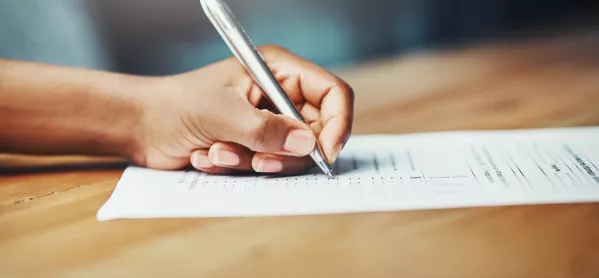- Home
- ‘Adjust GCSE school rankings to stop inequality’
‘Adjust GCSE school rankings to stop inequality’

Teacher-assessed rankings of pupils should be adjusted if there is evidence of bias against poorer pupils in the grading process this summer, according to the Sutton Trust.
The social mobility charity made the recommendations in its response to Ofqual’s consultation on its proposed teacher-assessed grades system, proposed after GCSEs and A levels were cancelled due to the coronavirus outbreak.
Williamson: ‘Shortened’ GCSEs in autumn a possibility
Covid-19 GCSE grades: No checks for bias within schools
Williamson: No free laptops until ‘end of May’
Pupils will receive calculated grades based on both the mark teachers believe students would have achieved had exams gone ahead, and a rank order of pupils by performance for every subject and grade submitted by each school.
However, in response to Ofqual’s consultation on the process, which ends today, the Sutton Trust said the exams regulator should intervene to adjust school rankings of individual pupils if there was evidence of systematic bias against disadvantaged students, stating that teacher assessment “potentially has structural biases”.
“It is critical that socioeconomic attainment gaps are monitored throughout the stages of the adjustment process, so it’s important that Ofqual have access to data on the free school meal/pupil premium eligibility of pupils,” the charity said.
“If systematic bias is evident, statistical adjustments should be considered, which may include changes to centre rankings.”
“Ofqual should be prepared to take such steps if required. If gaps were to widen significantly, this would have significant knock-on consequences for social mobility, as well as the credibility of this year’s grades.”
Ofqual previously stated it would not adjust teacher-assessed grades to take bias into account when it first published details of the consultation.
And Dr Gill Wyness of the Centre for Education Policy and Equalising Opportunities at UCL’s Institute of Education, whose research was cited in Ofqual’s literature review for the consultation, said that the CEPEO were “on the fence” when it came to adjusting school rankings for individual pupils to correct for bias.
In the CEPEO’s response to the consultation, it cites a 2013 study by Burgess and Greaves which found ethnic minority pupils were under-assessed by their teachers, and Dr Wyness’ own research showing that poorer high-ability students tend to be under-predicted compared with their wealthier peers.
“Thus, there may be cause for adjusting individual level rankings, e.g. moving low SES [socioeconomic status] / ethnic minority students up in a school. On the other hand, a danger of reducing the value of teacher ranks emerges when students may have more recently improved performance (i,e, since their last exam) and this would only be visible by their teacher,” the CEPEO’s response said.
“I think there is an important issue in trusting teachers best, so...we can see both sides of that really,” Dr Wyness told Tes.
Dr Wyness added that it was important that “outlier students” were not impacted negatively by the process of standardisation.
“We’re a little bit worried about students who might be slightly different-looking from their school if you’re going to standardise results on the basis of school performance,” she said.
“The type of students that you might be worried about are sort of outlier students, students who might be at a low-attaining school...but they themselves are quite high attainers, and it’s possible that their results might somehow be dragged down as a result of the standardisation,” which might “entrench any existing achievement gap, to the extent that less privileged pupils tend to attend historically low-attaining schools”.
The Sutton Trust also said that pupils from poorer backgrounds could face barriers to sitting exams in the additional autumn series. Today, Gavin Williamson said the autumn series of exams could be used by pupils who wished to contest their teacher-assessed grades.
“I particularly wanted children - if they did not think that the grade was a true and fair reflection on the work or what they were able to achieve - to have the opportunity to take an exam, and that’s why we’ve been working with Ofqual and the exam boards to provide an autumn serial of exams,” he said as he faced questions from the Commons Education Committee about the government’s provision for disadvantaged children.
However, the Sutton Trust’s response to Ofqual’s consultation, points out that the appeals process would be costly for disadvantaged pupils, and that they would face barriers to sitting exams in autumn.
“If these barriers are not removed, particularly at a time of upheaval such as this, they may prevent disadvantaged students from making an appeal and widen inequalities within the system between students. Students from poorer homes may also be less likely to be in a position to resit exams. The overarching principle should be to ensure that there are no inequalities in access to such remedies,” the charity said.
The Sutton Trust also called on Ofqual to ensure that schools with a “turnaround” year of students were not disadvantaged by “pegging results to previous years”.
Keep reading for just £1 per month
You've reached your limit of free articles this month. Subscribe for £1 per month for three months and get:
- Unlimited access to all Tes magazine content
- Exclusive subscriber-only stories
- Award-winning email newsletters



